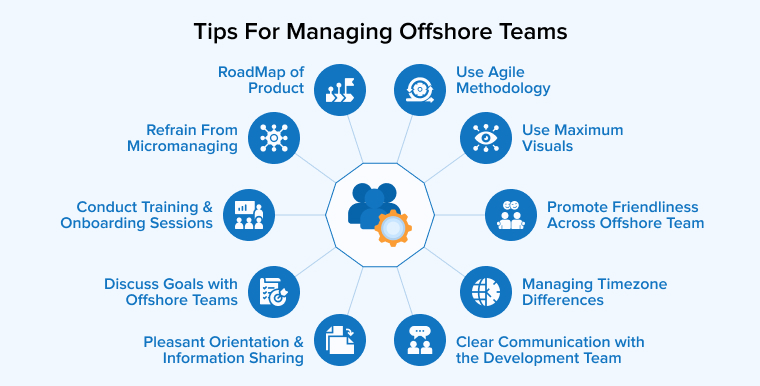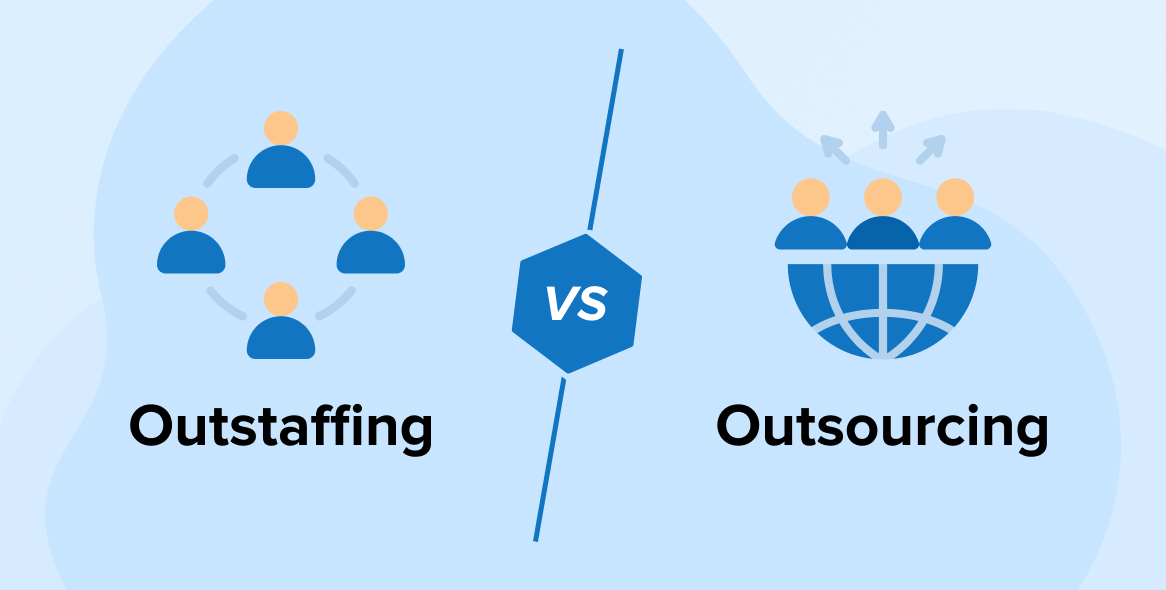
Managing offshore teams allows businesses to leverage diverse talent at reduced costs, but it also comes with unique challenges. Time zone differences, cultural barriers, and communication gaps can hinder productivity and collaboration if not properly addressed. A reliable offshore software development company delivers up to expectations, but you may not make the most out of their potential if you don’t know how to manage offshore teams effectively.
Successfully leading an offshore team requires more than just delegating tasks; it demands intentional strategies that bridge distances and foster a cohesive work environment. In this blog, we’ll explore common obstacles that any business faces when working with offshore teams and share practical tips to overcome them. Whether you’re new to outsourcing or looking to improve your current processes, these insights will help you manage your offshore team more effectively.
1. Challenges in Managing Offshore Teams

When businesses engage in offshore outsourcing, they often encounter several issues during collaboration. Common issues include inadequate communication with offshore software development teams and concerns related to data protection. Let’s explore some of the common challenges businesses face when collaborating.
1.1 Lack of Communication
Many businesses experience difficulty in establishing regular communication with offshore teams that are working in a different time zone. Lack of communication may lead to project failure, delays, as well as misunderstandings of goals and needs.
Solution
- Use platforms like Slack, Microsoft Teams, or Zoom to store, organize, and retrieve communications effectively.
- Hold daily or weekly meetings to align teams, while considering time zone differences to ensure inclusivity.
- Provide thorough project briefs using bullet points or checklists to simplify tasks and ensure everyone understands their responsibilities.
1.2 Cultural Barriers
Cultural differences often pose significant challenges when working with offshore teams. Even within the same country, variations in language, beliefs, and work habits can create misunderstandings and friction between in-house and remote teams, affecting collaboration and overall productivity.
To overcome these challenges, businesses can adopt the following strategies:
- Familiarize yourself with the professional norms and etiquette of the region where your offshore center operates.
- Establish clear and consistent communication channels to foster transparency and ensure everyone shares the same goals.
- Provide comprehensive training and mentorship to the offshore team to minimize miscommunication and conflicts.
- Implement a constructive feedback system that encourages open dialogue and collaboration between teams.
- Respect the offshore team’s traditions and cultural values rather than imposing your own business practices, and adapt your approach as needed.
1.3 Data Security
Outsourced offshore software development requires careful handling of intellectual property and sensitive company data, since risks such as data leaks, unauthorized access, and security breaches are common concerns.
To mitigate these risks:
- Work with a company that provides a clear non-disclosure agreement (NDA) and explicitly defines intellectual property rights in the contract, ensuring that all developed IP belongs to you.
- Set well-defined project goals, deadlines, payment terms, and approval processes to prevent conflicts and misunderstandings.
- Implement secure methods for data transfer, require binding confidentiality agreements, and ensure strict compliance with relevant data protection laws and industry standards.
1.4 Lack of Quality Control
Ensuring consistent quality can be difficult when offshore teams follow different coding standards or work practices. Variations in coding guidelines often lead to bugs, poor performance, and uneven results in the final software product. Additionally, a weak understanding of project objectives can contribute to poor quality outcomes. Addressing these issues requires a targeted approach.
- Implement a comprehensive quality assurance framework that clearly defines coding standards and includes thorough documentation.
- Conduct regular code reviews to identify and fix issues early. These audits help maintain consistent quality, reduce errors, and promote uniformity throughout the project.
- Establish quality control checkpoints at every phase—from initial design through deployment—to ensure development progress is continuously monitored and evaluated. These checkpoints help maintain consistent quality, reduce errors, and promote uniformity throughout the project.
2. Tips For Managing Offshore Teams

Your offshore team is not just a one-time project development team. You may need to add some value to your offshore software development team, which is dedicated to the long term. This implies that simply assigning tasks without providing context and expecting completion is not the most effective strategy.
Managing a team remotely can be difficult. When managing offshore teams, it’s important to follow the best practices. Consider these tips for efficiently managing offshore teams.
2.1 Discuss Goals with Offshore Teams
Once you hire a dedicated offshore team, it is crucial to communicate the project requirements clearly with the team. At the very beginning of the project, the offshore team should know what they are expected to develop. So, the first step in the software development process is to clearly define and share the project goals with the offshore staff. This ensures that everyone is on the same page.
Your offshore team must understand the larger picture. This process will allow them to dedicate enough time and effort to align with the vision for the product/service. Now they would understand what you hope to achieve with it, and where you envision your firm in the next five or ten years. That is why it is critical to discuss your company’s long-term goals with your offshore partner and ensure that it is in sync with you and your project manager.
2.2 RoadMap of Product
One of the most misleading points is when the project road map lacks transparency, and communication with the remote teams is weak. They tend to just do what they are advised to do without fully understanding the broader context. The product roadmap is a step-by-step development strategy for delivering a high-quality product. Each team member must understand the plan, the development process, the offshore delivery models, and how their individual contributions fit into the overall process.
The blueprint of the project development plan contains upcoming features and technological aspects, depicting how the product will grow in the future. The product plan is essential for securing funding. Although this process involves offshore developers, their contribution is significant to the project’s success. There are communication tools that help companies gain an advantage by transforming their ideas into actionable features and translating technology details into a business language that investors can understand. These tools also help them in project management.
Communicating the roadmap with the offshore employees is very important; it will help them bring multiple perspectives to the table, resulting in the implementation of the best ideas for app development.
2.3 Clear Communication With the Development Team
Transparent and consistent communication is essential for bridging the challenges posed by time zone differences and cultural diversity in offshore teams. To foster effective communication and improve overall productivity, several strategies can be implemented for offshore development teams.
- Leverage collaborative tools such as Slack, Zoom, Jira, or Asana to maintain seamless connectivity among team members. These platforms enable real-time messaging, video calls, and task management, ensuring everyone stays updated regardless of location.
- Schedule regular meetings that respect different time zones. These could include weekly sprint meetings, bi-weekly reviews, or daily stand-ups, depending on the project’s pace.
- Maintain thorough documentation. Record all project requirements, updates, changes, and feedback in accessible shared spaces to ensure clarity and reduce misunderstandings. This written record becomes a reliable reference for all stakeholders and supports smooth handoffs between teams.
2.4 Managing Timezone Differences
One of the most common challenges when working with offshore development teams is managing different time zones. When your in-house team and your offshore team have gaps in their work schedule, it can work in your favor. However, some businesses may have the misconception that such time differences will cause delays or reduce their competitiveness globally.
Many assume that working with an offshore development team is simple because time zone differences allow for around-the-clock productivity. It’s a common belief that you can limit interactions to early mornings or late evenings without disrupting your own schedule. However, this perspective overlooks real challenges. Time zone gaps and cultural differences can complicate communication and collaboration if not carefully managed. Businesses that ignore these complexities may encounter significant hurdles. To ensure a smooth and effective partnership with offshore teams, thoughtful planning and well-defined communication practices are crucial.
2.5 Refrain From Micromanaging
Every business values the freedom to work independently and dislikes being micromanaged. Growing your development team becomes challenging if you do not empower and trust your staff to complete their tasks effectively. For an offshore team to function smoothly, it is important to have a competent senior developer who can function as a team lead. Offshore team management becomes healthier and more effective when enough autonomy is provided for work.
If your offshore team is having trouble getting things done effectively, it may be due to a lack of senior-level leadership. Many businesses make the mistake of just trying to employ a slew of low-cost remote developers. To address this, consider keeping your project manager as the direct reporting manager for team tasks. This approach will ensure timely reports and help you maintain control over the project.
2.6 Make Your Offshore Team Comfortable to Promote Friendliness
Avoid creating an “us versus them” atmosphere when working with offshore employees. This could backfire and cause unnecessary problems, potentially slowing down or halting progress altogether. Make your offshore development teams seem like an extension of your organization rather than an external entity. Meet with them online regularly and involve them in all business synchronization and communications.
2.7 Use Maximum Visuals to Put Across Your Thoughts
Clear and concise communication is crucial in the software development process. To help your offshore teams quickly understand your message without reading text, consider using short videos or annotated screenshots. You may save a lot of time by filming a clip and emailing it to your team. This approach works whether you’re giving comments on their work, teaching them, discussing changes to the development process, or introducing new duties.
2.8 Use Agile Methodology
Agile development methodologies are an effective way to manage offshore development teams. Agile offers a flexible framework that encourages incremental progress and iterative improvements, enabling teams to respond quickly to feedback and changing market needs. By focusing on quality and efficiency, agile helps offshore teams deliver value consistently throughout a project. When combined with existing management practices, it can boost productivity and collaboration.
A major benefit of agile is its focus on prioritizing tasks based on business impact and client needs, which is crucial when working across time zones and with limited communication. This ensures offshore teams focus on the most important tasks, optimizing their time and efforts. Regular check-ins and transparent progress updates help close communication gaps and keep everyone aligned. Overall, adopting agile creates a more organized, adaptive, and efficient development process, making it easier to manage offshore teams and deliver high-quality software that aligns with business goals.
2.9 Pleasant Orientation and Information Sharing
Learning new technologies and services takes time, even for the most skilled developers. Therefore, successfully managing overseas teams requires a strong focus on recruitment and the skill acquisition procedure to guarantee that the team members fully understand the project’s goals, expectations, the company’s values, and work procedures. Hence, conduct their training on the best practices, technology stacks, and techniques used by your organization for software development, and make your documents available for them to study.
Effective onboarding and clear information sharing enable offshore team members to become productive quickly and integrate smoothly into the team culture. When team members are familiar with the project’s needs and procedures, there is less chance of confusion, leading to a reduced possibility of delays, errors, and misunderstandings.
2.10 Conduct Training and Onboarding Sessions
Conducting thorough training and onboarding sessions is essential for effectively managing offshore teams. These sessions align remote team members with your company’s goals, processes, and tools from the start. Clear onboarding ensures expectations are understood, reducing confusion and errors down the line. It also builds a sense of inclusion and connection with your in-house team. Investing time in proper training fosters stronger collaboration, faster integration, and ultimately leads to higher productivity and better project outcomes.
3. Final Takedowns
For companies looking for offshore outsourcing, there are no obstacles, as it can enhance profitability and performance. Offshore teams can be beneficial, providing businesses with various advantages. We hope this blog on managing offshore teams has eased concerns for your business and enabled your teams to successfully develop apps with the help of the right offshore team. We understand the importance and challenges involved in managing an offshore development team. Our experts can help you with unique solutions and the latest engagement models adopted by various organizations and their workforces.
FAQ
How do you manage working with the offshore team?
To manage your offshore team effectively, clearly communicate your vision, project goals, scope, and roadmap from the start. Establish clear communication channels and hold regular meetings to monitor the work speed and avoid errors at each development stage.
How do you communicate with an offshore team?
To communicate effectively with an offshore team requires establishing regular communication channels, providing the necessary technology for smooth teamwork, and ensuring that your offshore team clearly understands the project’s objectives, schedule, and deliverables.
In addition to this, it is essential to stay in touch with the team to get updates and provide feedback.
How do you collaborate with an offshore team?
To collaborate with an offshore team, ensure effective communication by being transparent, stating the obvious, and getting directly to the point.






This article offers valuable insights into the challenges and considerations involved in managing offshore teams. The emphasis on clear communication and establishing a clear roadmap aligns with best practices for effective team management, regardless of geographical location. Additionally, the discussion of setting goals and conducting regular meetings highlights the importance of keeping all team members informed and aligned throughout the project lifecycle.
This article provides valuable insights on managing offshore teams effectively. I found the tips on avoiding micromanagement and holding regular meetings particularly helpful. Thanks for Sharing!